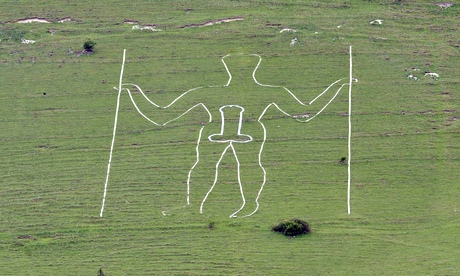
Today, researchers answered an age-old question: not “does size matter?”, but “am I normal”? An analysis of what is considered to be the average penis size has been published in the British Journal of Urology International. Pulling together 17 studies involving up to 15,521 males, we now know that 13.12cm (5.16 inches) in length is average for an erect penis. The figure is 9.16cm (3.6 inches) when flaccid.
Mankind has always been fixated with penises. Caves around the world are adorned with phalluses and phallic symbols tens of thousands of years old. Often, those drawings or ancient artefacts feature representations that would make even Dirk Diggler proud. The penis is a source of power and shame. Hotshot financial traders are known as “big swinging dicks” and the assertion of male domination is often couched in phallic terms: who’s got the biggest dick? Who’s going to slap it out on the table? The measuring never really stops and is a part of the anxiety. Am I big enough? What is big enough?
This preoccupation begins early. Little boys treat their penises like toys, and the more they can play with those toys the better. Sigmund Freud famously identified “penis envy” as being a stage during which adolescent girls feel an anxiety brought about by the realisation that they don’t have a penis. While this may be true for some girls, any man who has ever been in a communal changing room knows it’s equally true for a majority of men.
This is particularly obvious when boys hit puberty. At my school, the showers were communal and using them after playing sport was meant to be compulsory. Plenty of boys would wet their heads under a tap in the toilets, throw their clothes on over the islands of mud drying on their legs and slip off home. Some would wear swimming trunks in the showers. One was so proud and insecure that he confessed to getting his penis semi-erect before showering to impress everyone. The real alpha males were untroubled by such things. They would disrobe, strut into the showers, come out, envelope themselves in a cloud of Lynx and head out to meet girls.
This machismo can have a profound effect. A man interviewed by New York magazine last year talked about how having a micropenis had made him feel in relation to this: “I’m a pathetic little nothing, really; that’s what it’s made me feel like. I was raised around all these macho uncles and teachers who expected men to be men, and we all know what that really means.”
Variations on this scenario can be found in adult life at the gym but also in urinals. Some guys would rather lock themselves up in a stall than have another man eye them up. And while women like to go to the ladies’ together, men always go alone. Other sources of anxiety are easy to find. Men watch porn stars hung like horses and despair of ever being able to attract a woman. They can become obsessed with phallic symbols such as bats, knives and guns. Of more emotional significance are early sexual encounters, which can be fraught with penis-related anxiety.
These scenes are usually treated comically – even first sexual encounters (see American Pie et al) – but for the many men genuinely afflicted by penis anxiety and related issues, they are enormously fraught. The lead author of the study, Dr David Veale, from King’s College London’s Institute of Psychiatry, Psychology and Neuroscience, told me that, for most men, reassurance about average sizes is often comforting but that, “for some men who are very anxious, it doesn’t make any difference to them because they feel that they are inferior”. While much of the prevailing thought in issues relating to women’s bodies is geared around accepting all sorts of shapes and sizes, the pinning down of what is and isn’t a “normal” penis could be dangerous. After all, how much comfort can you take if you fall outside the range? And how much comfort can you take if you fall within the average range but, for psychological reasons, you feel inadequate?
Veale admits that the study is “more helpful for men who are more flexible in their thinking” and points out that he feels as though its findings are – unsurprisingly given the schoolyard potential the subject matter has – being blown out of proportion. Nevertheless, the options being peddled to those suffering from penis anxiety concern him. “There’s all sorts of nonsense out there on the internet, all sorts of rubbish, surgery is ridiculous … what have we come to?”
His study, then, is an attempt to place the worries of certain men in context. As a psychologist, he says he can’t “point to any evidence that psychological interference has any effect”. This admission indicates the myriad issues at play with men and penis anxiety. Veale hopes the study will at least provide something concrete, but knowing what is and isn’t normal isn’t going to stop the measuring competition. There’s just too much symbolic and psychological attachment to the penis for that.

